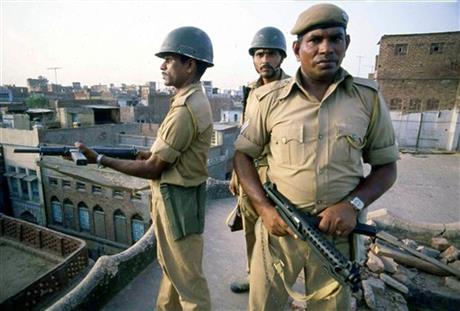 By RAPHAEL SATTER
By RAPHAEL SATTER
FILE – In this June 6, 1984 file photo, Indian troops take up position on rooftops around the Golden Temple, in Amritsar, India, after soldiers started to move into the complex to quell the source of the recent Sikh violence. The British government ordered an urgent investigation Tuesday Jan. 14, 2014 into the possibility that a U.K. officer played a key role in the deadly 1984 raid on India’s Golden Temple after declassified documents suggested a special forces officer advised the Indians on how to carry out the attack. (AP Photo, File)
Britain Temple Raid
FILE – In this June 6, 1984 file photo, Indian troops take up positions around the Golden Temple, in Amritsar, India, after soldiers started to move into the complex to quell the source of the recent Sikh violence. The British government ordered an urgent investigation Tuesday Jan. 14, 2014 into the possibility that a U.K. officer played a key role in the deadly 1984 raid on India’s Golden Temple after declassified documents suggested a special forces officer advised the Indians on how to carry out the attack. (AP Photo, File)
Prev 1 of 2 Next
LONDON (AP) — The British government ordered an urgent investigation Tuesday into the possibility that an U.K. officer played a key role in the deadly 1984 raid on India’s Golden Temple after declassified documents suggested a special forces officer advised the Indians on how to carry out the attack.
The storming of the Golden Temple in Amritsar was one of the most violent episodes in the Indian government’s battle against Sikh separatists, whose campaign for an independent homeland in the Punjab region of India smoldered into the 1970s and 80s.
Papers recently made public and posted to the Stop Deportations blog detailed a secret advisory mission to India by an unnamed officer from the Special Air Service, one of Britain’s most elite military units. It’s not clear whether the Indians followed the officer’s plan, but the allegation that Britain played a role in the raid is explosive because the attack was spectacularly bloody, leading to hundreds of deaths and a breakdown in communal relations across India.
In a statement, the government acknowledged that the raid “led to a tragic loss of life and we understand the very legitimate concerns that these papers will raise.” It said Prime Minister David Cameron had been caught unaware by the paper’s content and had ordered an urgent investigation into the matter.
“Any requests today for advice from foreign governments are always evaluated carefully with full ministerial oversight and appropriate legal advice,” the statement added.
The Indian army’s attack on hundreds of heavily armed Sikh separatists barricaded inside the Golden Temple in June of 1984 led to massive loss of life and a breakdown in communal relations across India. Later that year, Indian Prime Minister Indira Gandhi was assassinated by two Sikh bodyguards, and the country was swept by a wave of anti-Sikh rioting.
The British officer’s secret mission, disclosed in a February 1984 letter between two high-ranking officials serving ministers in the government of Margaret Thatcher, talked of an Indian request for British advice on how to remove the Sikhs, saying that a plan was drawn up and “approved by Mrs. Gandhi.”
“The Foreign Secretary believes that the Indian Government may put the plan into operation shortly,” the letter stated.



